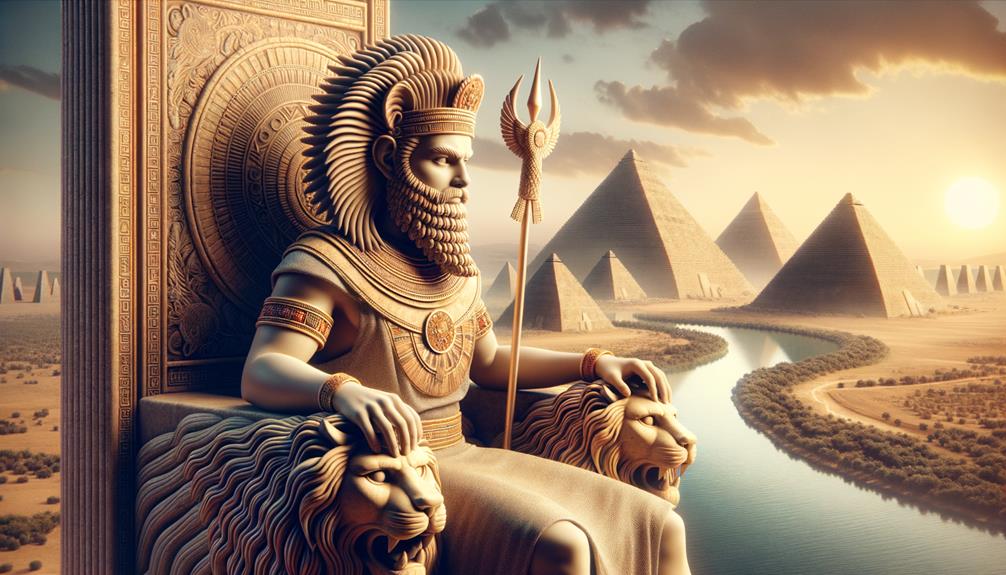Delving into the Life of the Legendary King Gilgamesh
Picture the ancient city of Uruk, its grandeur and majesty, home to one of history's most intriguing figures: King Gilgamesh. Erected by this legendary Sumerian ruler, the city's walls stand as a testament to his rule during the Sumerian's Early Dynastic Period. Yet, Gilgamesh's story truly unfolds in the world of myth and legend.
The Epic of Gilgamesh: Ancient Sumerian Beliefs and Societal Norms
The Epic of Gilgamesh paints a vibrant picture of ancient Sumerian culture, interweaving tales of power, heroism, and the timeless human desire for immortality. It's like a rich tapestry that showcases the beliefs and societal norms of that era. But it also presents an intriguing question: How much of the epic is a glorification of a once living king, and how much is mere fabrication, a creation of the storyteller's imagination?
Balancing Truth and Myth: The Dichotomy of Gilgamesh
This dichotomy between history and mythology surrounding Gilgamesh demands a deeper exploration. Take the story of his quest for immortality, for example. It's a universal theme that resonates with us today, reflected in our ongoing scientific pursuits for extending human lifespan. But was this a real quest undertaken by Gilgamesh, or a symbolic narrative crafted by ancient scribes?
Unraveling the Legacy of Gilgamesh: Fact or Fiction?
The legacy of Gilgamesh is a fascinating blend of fact and fiction, a complex tapestry woven from the threads of history and mythology. It's an engaging tale that continues to captivate audiences, prompting us to question, to explore, and to seek the truth behind the legend. The life of Gilgamesh offers a unique glimpse into the past, yet underscores themes that remain relevant today, making it a timeless tale worth exploring.
In conclusion, the journey through the life and legacy of King Gilgamesh is an exciting one. It's a blend of history and mythology that offers valuable insights into ancient Sumerian culture, and raises intriguing questions about the nature of historical truth. So why not embark on this journey of discovery, delve into the epic, and uncover the secrets of the legendary King Gilgamesh for yourself?
Gilgamesh: The Historical King

Gilgamesh: The King Who Transcended History
Diving into the depths of ancient history, we come face-to-face with the extraordinary Gilgamesh, a sovereign of the Sumerian city-state, Uruk. This influential king reigned during 2800-2500 BC and is renowned for his notable accomplishments, such as the construction of the Uruk walls.
The Sumerian King List credits him with a reign that spanned an astonishing 126 years. While this figure might be an exaggeration, it certainly emphasizes his long-lasting impact. Intriguingly, his reign coincides with King Enmebaragesi of Kish, another significant figure of the era.
Gilgamesh: A Semi-Mythic Hero
Gilgamesh's intriguing persona is a blend of historical and semi-mythical elements. His heroic deeds are immortalized in the Epic of Gilgamesh, a Babylonian epic that portrays him as a larger-than-life figure on a quest for immortality. This timeless tale not only influenced several subsequent literary works, including the Bible, but also offers a valuable window into the ancient worldview.
Gilgamesh Vs. Other Ancient Kings
When juxtaposed with other Sumerian and Babylonian rulers, Gilgamesh truly shines. His tangible and legendary feats, combined with his lasting cultural impact, affirm his status as a colossus of ancient history.
Deification and Legendary Exploits
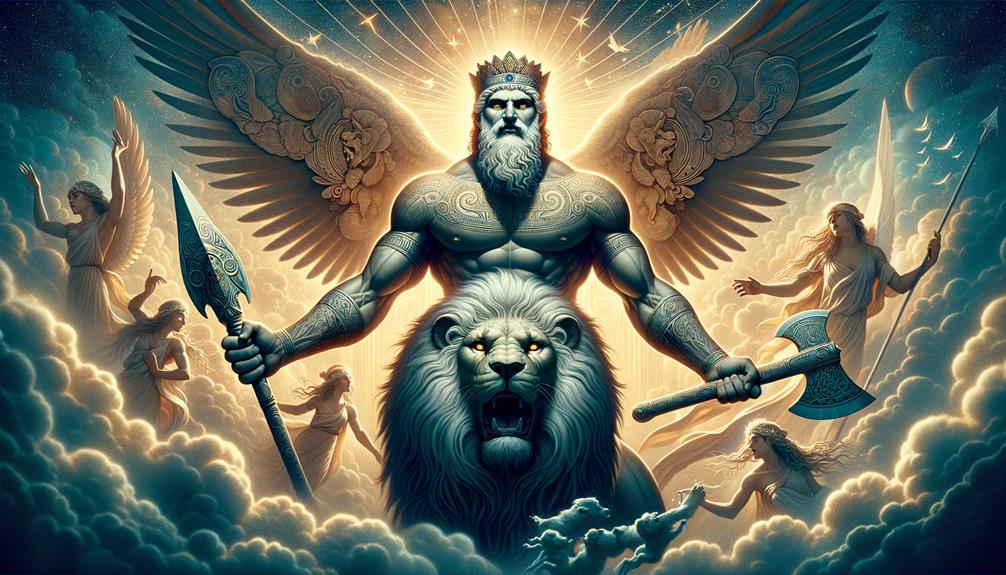
Gilgamesh: A Deified Hero-King's Legendary Feats
The astounding narrative of Gilgamesh, the ancient Sumerian king, unfolds as a unique tale, etched onto the canvas of antiquity. His historical deeds, legendary exploits, and deification intertwine to construct a remarkable persona, transcending his impressive 126-year reign. This story unveils how Gilgamesh morphed into more than a mere king, ascending to the status of a demigod and epitomizing the Sumerian concept of a hero-king.
Gilgamesh: A Demigod's Birth and Achievements
Born to Lugalbanda, a priest-king, and Ninsun, a goddess, Gilgamesh arrived at the crossroads of divinity and humanity. His half-human, half-divine lineage bestowed upon him unparalleled strength and valor. Gilgamesh's achievements encompass the construction of the imposing walls of Uruk, a tangible symbol of his leadership prowess and a testament to his unprecedented power.
Gilgamesh's Epic Exploits: Slaying the Bull of Heaven
Gilgamesh's legendary tales paint him as a hero of extraordinary proportions. One such story recounts his intense battle with the Bull of Heaven, a fearsome creature dispatched by the gods as punishment. His successful vanquishing of this threat underscores his audacity and combat skills, portraying him as a daring warrior.
The Deification of Gilgamesh: A Symbol of Ideal Kingship
What truly distinguishes Gilgamesh is his deification. Revered and worshipped, he was viewed as a divine kin and ally by subsequent kings, solidifying his immutable position in Sumerian history and mythology. His deification not only encapsulated his extraordinary accomplishments but also represented the ideal kingship in ancient Sumer.
The tale of Gilgamesh serves as an intriguing real-world example of how stories can inspire and engage. Whether you're a history enthusiast or a curious reader, diving into the world of Gilgamesh offers a captivating journey into the past. We recommend immersing yourself in the Epic of Gilgamesh, a renowned piece of ancient literature that offers a comprehensive exploration of this fascinating hero-king's life.
Influence of Gilgamesh's Tale
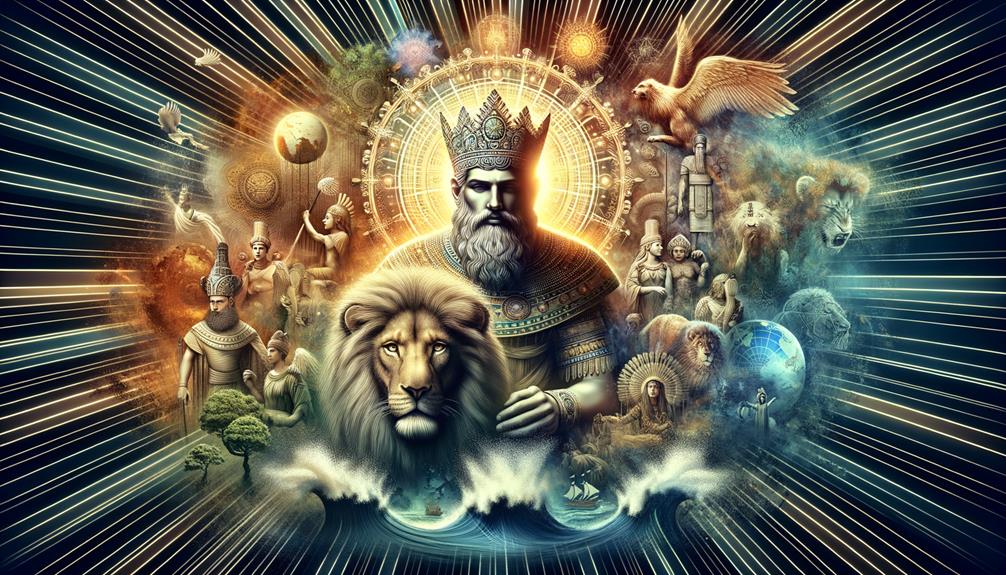
Gilgamesh's Tale: An Enduring Legacy
Plunging into the impact of Gilgamesh's tale, it's fascinating to observe how this primordial epic has not merely influenced subsequent literary masterpieces such as the Iliad and the Odyssey, but its reverberations linger in the narratives of the Hebrew Bible. This stirred quite a debate upon its emergence in the 19th century. The Epic of Gilgamesh, one of the earliest known works of global literature, offers a treasure trove of insights into ancient Mesopotamian ethos and values.
Table: The Spectrum of Gilgamesh's Influence
| Gilgamesh's Impact | Example | Source |
|---|---|---|
| Literature | Iliad, Odyssey | Greek Epics |
| Religious Texts | Hebrew Bible | Abrahamic Traditions |
| Mythology | Quest for Immortality | Universal Themes |
| Cultural Constructs | Good vs Evil | Modern Interpretations |
| Historical Records | Sumerian King List | Ancient Inscriptions |
The verses that detail his mystical journeys and heroic deeds present a window into the Sumerian texts' worldview and the extensive Babylonian Epic tradition. As a recognized historical figure, the tale of Gilgamesh perpetually enthralls readers, prompting us to reconsider our understanding of good and evil. It resonates with our personal battles, thereby solidifying its influence in literature and culture.
Gilgamesh's Legacy: A Timeless Tale
The tale of Gilgamesh is not just a story, it's a legacy that has stood the test of time, influencing our understanding of history, culture, and human nature itself. As we navigate through his adventures and trials, we find ourselves immersed in a world that, while ancient, speaks volumes about the constants of human life.
Modern Interpretations of Gilgamesh
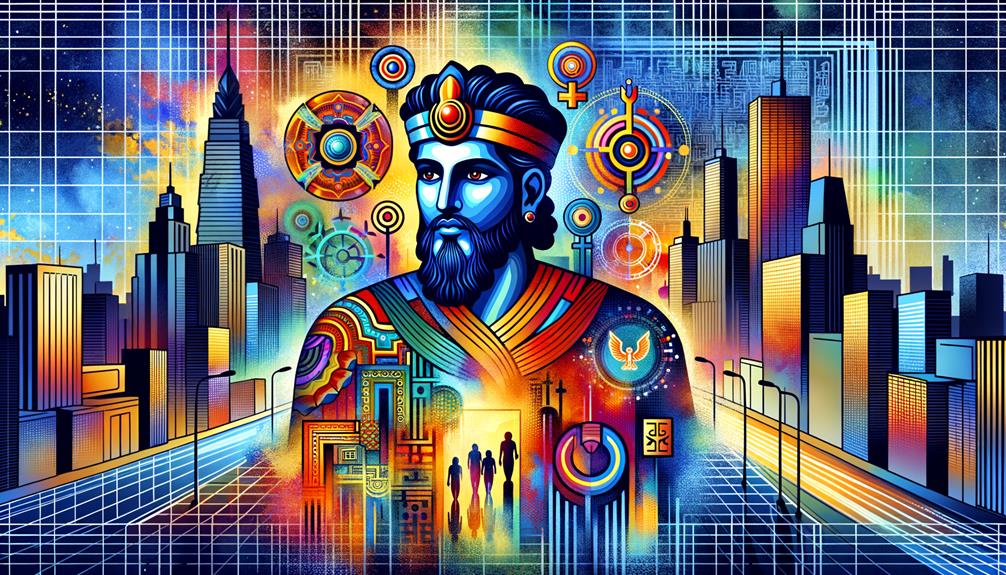
The Timeless Allure of Gilgamesh: A Modern Perspective
Unraveling the myriad of contemporary interpretations of Gilgamesh, it becomes evident that this legendary figure is viewed as a richly complex character, embodying humanity's struggles and aspirations far beyond his heroic persona. Delving into these interpretations, three distinct perspectives emerge:
1. An Epic Tale Resonating Across Time
Gilgamesh, as the earliest recorded epic poem, continues to stir hearts with its exploration of life's meaning and the fear of death. The cuneiform tablets found in ancient ruins aren't just archaeological artifacts; they form the bedrock of our understanding of this heroic figure. These scripts have survived millennia, attesting to the power of a story that resonates deeply with our shared human experience.
2. A Profound Exploration of Friendship, Mortality, and Meaning
In numerous adaptations, Gilgamesh's journey becomes an intense exploration of friendship, mortality, and the quest for meaning. This perspective reveals a universal human experience, masterfully encapsulated in an ancient narrative. It's like reading a diary entry from someone who lived thousands of years ago, reminding us of the timeless nature of our shared human experiences.
3. Psychological and Philosophical Insights
Gilgamesh also lends itself to modern interpretations from psychological and philosophical viewpoints. These unique perspectives shed light on human nature, identity, and the pursuit of transcendence. It's akin to peering through a window into the human soul, using this age-old narrative as a lens.
In essence, the epic of Gilgamesh continues to captivate us, embodying timeless themes that remain relevant today, just as they were thousands of years ago. Its enduring influence highlights the power of storytelling, the constancy of human desires, and the universality of our fears.
Gilgamesh's Cultural Significance
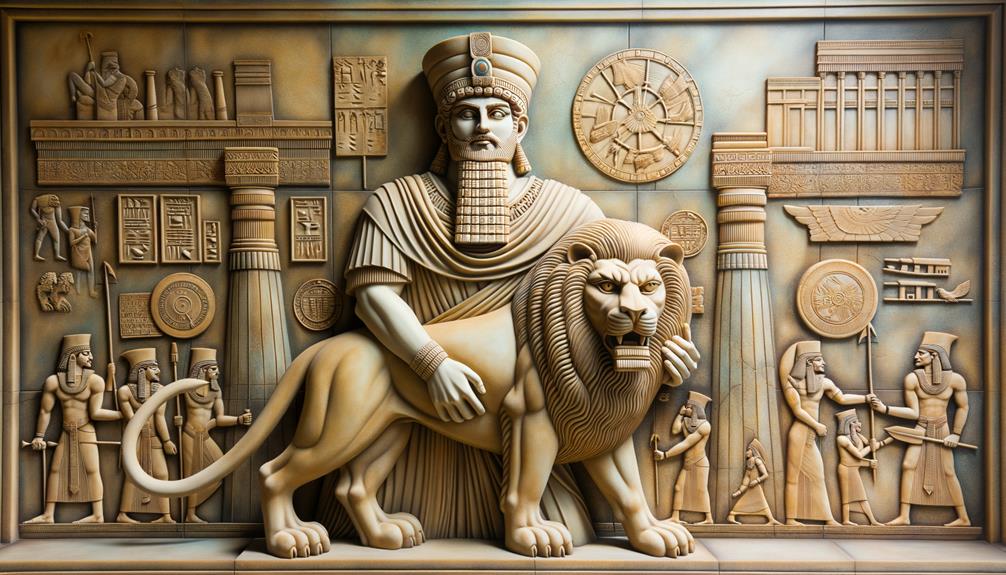
Understanding Gilgamesh's Cultural Impact
Analyzing Gilgamesh's cultural influence provides a clear understanding of how this historical icon has shaped not just ancient documents, but also contemporary views on literature and ancient Mesopotamian civilization. As the first prominent hero to grace literature pages, Gilgamesh's stature as a demigod, embodies both immense power and profound wisdom. His legendary adventures are beautifully narrated in ancient Sumerian poems, shining a spotlight on his unending quest for eternal life, thus cementing his pivotal position in cultural storylines.
Gilgamesh: A Timeless Tale
The Epic of Gilgamesh, which encapsulates his life journey, strikes a chord with today's readers for its exploration of eternal themes. His deep bond with Enkidu, his most cherished companion, offers compelling insights into the essence of true friendship and unwavering loyalty. In his pursuit of immortality, Gilgamesh mirrors the universal human yearning to comprehend the mysteries of life and death. These stories, engraved in the ancient Tablet, have elevated Gilgamesh to an immortal status in global literature and cultural legacy.
The Legacy of Gilgamesh
Gilgamesh's importance goes beyond the bounds of ancient Sumerian culture. His epic tale serves as a portal into the world of ancient Mesopotamian society, providing us a pathway to understand and explore human existence in its earliest literary representation.
The Power of Gilgamesh's Narrative
Frequently Asked Questions
Was Gilgamesh a Real Sumerian King?
Was Gilgamesh a Genuine Sumerian Monarch?
Absolutely, Gilgamesh was an authentic Sumerian ruler. His rule wasn't a fleeting moment in history—it was thoroughly chronicled. The tale of his relentless quest for eternal life has not only left indelible marks on literature but has also resonated within the pages of the Hebrew Bible.
The Authenticity of King Gilgamesh
The vibrant annals of history confirm that Gilgamesh wasn't just a myth, but a real-life Sumerian king. His reign was no mere transient occurrence—it was a significant period that left an enduring legacy, meticulously recorded in historical documents.
Gilgamesh's Epic Quest for Immortality
His monumental quest for immortality has left a profound impact. This epic journey didn't merely shape literature—it also found its echoes in the sacred text of the Hebrew Bible. This attests to the lasting influence of Gilgamesh's story that transcends the boundary of time and culture.
The Lasting Impressions of Gilgamesh's Reign
The impressions Gilgamesh left behind are not just found in the annals of history, but also in the minds of individuals who have delved into his story. His relentless pursuit of eternal life, documented in his epic, continues to resonate with readers and scholars alike, making Gilgamesh's reign a fascinating subject of study even today.
In the realm of literature and history, Gilgamesh's epic journey is a remarkable testament to the human spirit's undying quest for immortality. It's a tale worth exploring for anyone interested in ancient civilizations and their enduring impact on modern-day culture and thought.
Explore the World of Gilgamesh
To better understand the lasting impact of King Gilgamesh, we recommend the book "The Epic of Gilgamesh". This book offers a comprehensive look at the life and reign of Gilgamesh, reiterating the importance of his quest for immortality and his influence on literature and beyond.
What Was Gilgamesh Famous For?
Gilgamesh: The Immortal Hero
The question often arises, "What is Gilgamesh renowned for?" Regarded as a legendary figure, Gilgamesh is primarily celebrated for his relentless pursuit of eternal life. His epic journey encapsulates the human desire for immortality, making it a timeless tale.
Strength and Leadership: Gilgamesh's Hallmarks
Gilgamesh wasn't just an intrepid adventurer; he was a leader of unparalleled strength. His most prominent physical accomplishment, the construction of Uruk's mighty walls, serves as a real-world example of his extraordinary abilities. These walls weren't just fortifications, but a symbol of his indomitable spirit, his resilience, and his dedication to his people.
Engaging Epic Adventures
Diving deeper into Gilgamesh's exploits, you'll find a man who was more than just a king. His quests for immortality, encapsulated in the timeless epic that bears his name, offer a fascinating insight into ancient beliefs and values. Stepping into his shoes, we get to experience the fears, hopes, and struggles of a man who dared to challenge the gods themselves.
Be Inspired by Gilgamesh's Story
Gilgamesh's tale is a potent reminder of our mortality and the lengths we'll go to defy it. It's a story that engages us, challenges us, and ultimately, enriches us. His epic adventures continue to be a source of inspiration for countless books, movies, and games. For a firsthand experience, the Epic of Gilgamesh is a must-read.
Gilgamesh's Legacy: Timeless and Influential
In conclusion, Gilgamesh's fame rests not just on his incredible strength or his leadership qualities but on his epic journey in pursuit of immortality. His story has influenced countless generations, becoming a cornerstone of human culture and literature. It serves as a testament to our enduring desire for life and meaning.
This article is more than just a summary of Gilgamesh's accomplishments; it's an invitation to engage with a story that has resonated through millennia, and will undoubtedly continue to do so.
Why Is Gilgamesh the World's Famous Sumerian Leader?
Understanding Gilgamesh: The Remarkable Sumerian Leader
Gilgamesh's worldwide fame is deeply rooted in his epic narrative that delves into universal human experiences. Intriguingly, this exemplary Sumerian leader's tireless pursuit of eternal life, his extraordinary adventures, and exceptional command abilities distinguish him as a unique presence, even amidst the pantheon of ancient leaders.
Unearthing the Epic of Gilgamesh
Gilgamesh's fame is illuminated by his legendary narrative, the "Epic of Gilgamesh." This tale, rich with timeless human themes, provides a profound exploration of life's fundamental questions. For instance, his relentless quest for immortality is a reflection of mankind's age-old aspiration to conquer death. This pursuit, alongside his remarkable exploits, makes him a compelling figure, captivating audiences across the ages.
Leadership and Legendary Exploits
Beyond his epic tale, Gilgamesh's leadership qualities are another key to understanding his lasting fame. His rule, marked by wisdom and strength, set the benchmark for leadership in ancient times. This, coupled with his legendary exploits – such as his battle with the fearsome monster Humbaba – gives us a real-world example of the heroics expected from leaders of yore.
Gilgamesh: An Enduring Symbol of Heroism
In conclusion, Gilgamesh's fame as a prominent Sumerian leader is well-deserved. His intriguing quest for immortality, legendary exploits, and exceptional leadership qualities make him a standout figure in history. He is not just a leader but an enduring symbol of heroism, whose tale continues to inspire and engage audiences around the world. Notably, his narrative serves as a reminder of the timeless human themes that connect us all, making his tale much more than just a historical artifact.
With these insights in mind, it's recommended to delve into the "Epic of Gilgamesh" for a firsthand experience of this legendary leader's extraordinary journey.
Who Is the King of the Gods Gilgamesh?
Let's Clear Up the Misunderstanding: Gilgamesh, A Demigod Not a King of Gods
There appears to be a little mix-up here, so let's set the record straight. Gilgamesh, contrary to some beliefs, is not regarded as the king of gods. Instead, he holds the title of a *demigod*, a status that straddles the line between the mortal and the divine.
As a key figure in ancient literature, Gilgamesh's heroic exploits are celebrated in the Epic of Gilgamesh. This epic is a treasure trove of thrilling quests and daring adventures.
Who is Gilgamesh?
Gilgamesh is a hero who transcends the pages of literature, and his deeds are etched into the annals of history. His renown extends far beyond his home city of Uruk, reaching the corners of the ancient world.
To understand the essence of Gilgamesh, imagine a figure of immense strength and courage. Picture a leader who embarks on epic quests, faces formidable foes, and returns with tales of grandeur. That's the undeniable allure of Gilgamesh, the demigod.
Why Not a King of Gods?
The title 'King of Gods' is typically reserved for the supreme deity in a pantheon, a role Gilgamesh doesn't fill. He stands as a hero, a figure of admiration, but not a ruler of divine beings.
To wrap this up, don't mistake Gilgamesh for a king of gods; he's a demigod with a heroic legacy worthy of remembrance. Dive into the Epic of Gilgamesh, explore his adventures, and you will discover a figure of enduring fascination.

